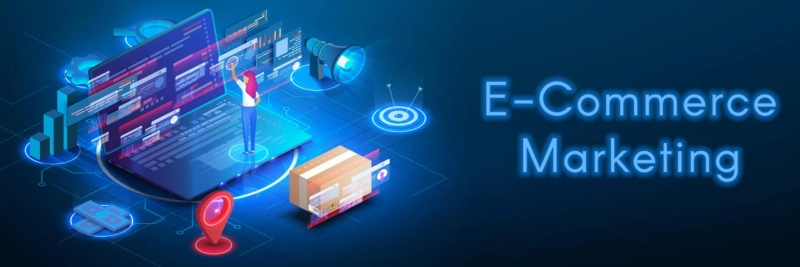Introduction
In today\'s digital era, commerce has significantly migrated online platforms and requires robust marketing strategies adapted to their challenges and opportunities. For these businesses to thrive online, they require dedicated expertise in online retail to navigate its complexities effectively and drive sustainable growth; herein lies e-commerce marketing agencies\' pivotal role. This article delves deeper into their impactful contributions toward the success of online companies.
Understanding E-commerce Marketing
- Basics of E-commerce Marketing: E-commerce marketing encompasses an umbrella term covering strategies used to market products or services online platforms, with key components including search engine optimization (SEO), pay-per-click advertising (PPC), social media marketing (SMM), email marketing content creation optimization conversion rate optimization(CRO), conversion rate optimization (CRO). All these activities boost brand recognition by targeting specific audiences while driving conversions.
- Challenges and Opportunities: E-commerce marketing poses unique obstacles, including rapidly shifting consumer preferences and fierce competition. At the same time, however, it presents significant opportunities, including reaching an international audience via multiple channels while capitalizing on data insights to engage customers across channels effectively. Successful e-commerce marketing necessitates an in-depth knowledge of these dynamics to be successful.
- Importance of Effective Marketing Strategies: Successful e-commerce operations depend upon effective marketing strategies that drive traffic and sales while building brand recognition, creating customer loyalty, and optimizing the return on investment (ROI). Given today\'s increasingly competitive environment, businesses must employ comprehensive strategies to stand out and thrive.
Role and Scope of E-commerce Marketing Agencies
- Define and Scope E-commerce marketing agencies specialize in offering tailored online business marketing solutions through search engine optimization (SEO), pay-per-click advertising (PPC), social media management (SMM), email marketing campaigns and website optimization - to name just some activities that fall under their purview. Ecommerce agencies leverage their experience and talent to develop strategies tailored to their client goals.
- Services Offered E-commerce marketing agencies typically offer a full suite of services tailored specifically for each client\'s needs, such as Search Engine Optimization (SEO). SEO involves optimizing website content and structure to increase rankings on search engines like Google.
This may involve: 1. SEO: SEO stands for Search Engine Optimization. It\'s the process of optimizing websites to rank higher in search engine results, boosting organic traffic.
- Pay-Per-Click (PPC) Advertising: Setting up and overseeing targeted ad campaigns using platforms like Google Ads or Facebook Ads.
- Social Media Marketing (SMM): Engaging audiences via social media platforms to build brand recognition and drive traffic to websites or services.
- Email Marketing: Conceiving and executing email campaigns to nurture leads and promote products or services. 5 Content Marketing: Producing relevant, valuable, and shareable content like blog posts, videos, or infographics to attract and keep customers.
- Conversion Rate Optimization (CRO): CRO involves examining user behaviors and optimizing website elements to increase conversion rates. In contrast, Affiliate Marketing involves collaborating with influencers or affiliates to promote products and drive sales.
- Influencer Marketing: Collaborating with influencers to reach target audiences and build brand credibility.
- Website Design and Development: Designing user-friendly websites optimized for conversions and the best experience.
Benefits of Hiring an E-commerce Marketing Agency
Partnering with an e-commerce marketing agency brings several advantages:
- Expertise and Experience: Partnering with an agency brings expertise in building effective strategies and producing tangible results for e-commerce retailers.
- Time and Resource Efficiency: Outsourcing marketing tasks allows businesses to better focus on core operations by freeing up valuable time and resources for core operations activities.
- Access to Cutting-Edge Tools and Technologies: Agencies can access state-of-the-art tools and technologies that increase campaign efficiency and effectiveness.
- Customized Strategies: E-commerce marketing agencies create customized strategies tailored to their client\'s goals to optimize effectiveness.
- Continuous Tracking and Adjustments: Agencies can constantly monitor campaign performance, adapt strategies to optimize results, stay ahead of trends with their strategies, and adjust in real-time for optimal outcomes.
How to Select an E-commerce Marketing Agency
- Assess Your Goals and Needs: Establish specific marketing goals while noting where external experts may need additional expertise.
- Make Your Selection: Bounce off ideas between agencies before selecting one you are comfortable working with on projects. Attaining Agency Expertise and Experience: Search for agencies with proven expertise and industry experience in e-commerce marketing.
- Review Past Work and Client Testimonials: Assess past projects and client testimonials to understand a company\'s capabilities, client satisfaction levels, and transparency and communication within an agency.
- Prioritize Open Communications and Updates on Campaign Progress: Seek an agency that prioritizes open communications as it updates you regularly about campaign status changes and provides regular progress updates for campaign management purposes.
- Evaluate Pricing and Budget Considerations: Assess pricing structures against your budget to ensure they deliver value for money.
- Verify Ethical Marketing Practices: Verify that the agency follows ethical marketing practices consistent with industry standards and guidelines.
Trends in E-commerce Marketing:
- Personalization and Customer Segmentation: Using data, personalized experiences can be delivered, and targeted messaging can be presented directly to each customer.
- Voice Search Optimization: Optimizing content and campaigns to address the rise of voice-enabled devices.
- Visual Commerce and Augmented Reality (AR): Integrating immersive technologies like AR to enrich shopping experiences while driving engagement.
- Integration With AI And Machine Learning: Utilizing AI-driven insights And Automation To Simplify Marketing Processes And Improve Targeting
- Video Marketing And Live Streaming Harness the power of video content creation And streaming live events To engage audiences showcasing products
- Sustainability Initiatives And Ethical Marketing Practices To Meet Consumer Demand And Build Trust
Conclusion
E-commerce marketing agencies play a pivotal role in helping online businesses navigate the complexities of digital marketing to achieve sustainable growth and unlock full potential in an ever-evolving e-commerce ecosystem. With an experienced partner, businesses can confidently navigate this digital terrain to drive success in online marketplaces.



